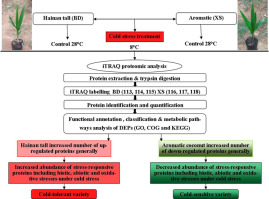当前位置:
X-MOL 学术
›
J. Proteomics
›
论文详情
Our official English website, www.x-mol.net, welcomes your feedback! (Note: you will need to create a separate account there.)
iTRAQ-based comparative proteomic analysis of two coconut varieties reveals aromatic coconut cold-sensitive in response to low temperature.
Journal of Proteomics ( IF 3.3 ) Pub Date : 2020-03-31 , DOI: 10.1016/j.jprot.2020.103766 Yaodong Yang 1 , Mumtaz Ali Saand 2 , Walid Badawy Abdelaal 1 , Jun Zhang 1 , Yi Wu 1 , Jing Li 1 , Haikuo Fan 1 , Fuyou Wang 1
Journal of Proteomics ( IF 3.3 ) Pub Date : 2020-03-31 , DOI: 10.1016/j.jprot.2020.103766 Yaodong Yang 1 , Mumtaz Ali Saand 2 , Walid Badawy Abdelaal 1 , Jun Zhang 1 , Yi Wu 1 , Jing Li 1 , Haikuo Fan 1 , Fuyou Wang 1
Affiliation

|
Coconut (Cocos nucifera L.) is an important economic fruit and oil crop largely cultivated in humid and sub-humid tropical coastal zones worldwide. To date proteomic profile analysis of coconut under cold stress yet not been conducted. In order to understand the cold stress tolerance in coconut, the iTRAQ approach was employed to dissect proteomic response of two coconut varieties Hainan Tall, BenDi (BD) and Aromatic coconut, XiangShui (XS) under cold stress. Under cold treatment at (8 °C) for 2 days, 193 up and 134 down-regulated in BD (Cn-DB-0_VS_Cn-DB-2) and 140 up and 155 down-regulated DEPs in XS (Cn-XS-0_VS_Cn-XS-2) were identified. The 5 days post cold treatment also identified increased abundance of up-regulated proteins in BD compared to XS. The 5 days post treatment (dpt) depicted 172-up/127-down and 108-up/134-down accumulated proteins for BD (Cn-DB-0_VS_Cn-DB-5) and XS (Cn-XS-0_VS_Cn-XS-5) respectively. A total of 22, 12 and 14 DEP categories were enriched in biological process, cellular component and molecular function respectively in Gene Ontology (GO) analysis of two coconut varieties. Metabolic and biosynthesis of secondary metabolites pathways were highly enriched in KEGG pathway analysis of DEPs between two varieties. Twenty-two different functional classes revealed differentially expressed proteins in two varieties. Among those, four major categories involved in metabolism, stress response, photosynthesis and respiration related DEPs increased abundance in two varieties. However, general function perdition only (GFPO) and stress-responsive proteins were greatly up-regulated in BD than XS. Increased abundance of stress response related proteins up-regulation under cold stress suggested that BD is cold-tolerant variety. Collectively, iTRAQ-based coconut leaf proteomic analysis showed that XS (aromatic) coconut variety is cold-sensitive compared to BD (Hainan Tall) variety. This study provided a basis for further functional analyses to understand the molecular mechanisms of tropical crops adapting to cold stress. SIGNIFICANCE: Leaf proteomic approach determines the role of differentially expressed proteins (DEPs) under cold stress in crops. However, cold stress could damage the coconut fruit lead to decrease in crop yield during winter in China. Here, we report the first ever iTRAQ-based proteomic analysis of two coconut varieties in response to cold stress. The study identified the proteins involved in biosynthesis of secondary metabolites, photosynthesis, respiration, biotic and abiotic stresses under cold stress in two coconut varieties. Moreover, the increased abundance of stress-responsive and general function proteins in BD under cold stress suggested that Hainan Tall is cold-tolerant compared to aromatic coconut variety. Inhibition abundance of photosynthesis related proteins may reduce photodamage owing to the over energized state of thylakoid membrane lead to ROS generation during oxidative stress. This could be the reason for adaption of BD to low temperature stress. Nonetheless, further research may insight the mechanism involved in cold tolerance/sensitive in coconut in response to low temperature.
更新日期:2020-03-31


























 京公网安备 11010802027423号
京公网安备 11010802027423号